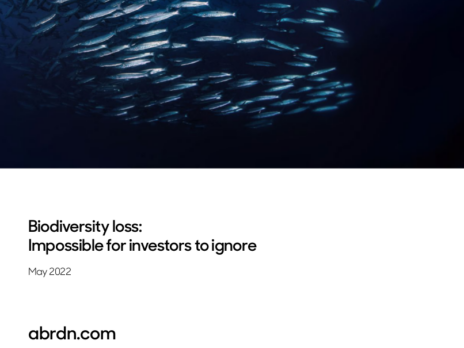

In September, the Net Zero Asset Owner Alliance (NZAOA) – a UN-convened group committed to net-zero investment – published its second progress report. The numbers were impressive, with membership having grown sixfold since the body’s inception in 2019, standing at 74 institutional investors with more than $10.6trn in assets under management.
All members are committed to transitioning their portfolios to net-zero GHG emissions investment by 2050 and such bulging membership speaks to the remarkable strides sustainable investing has made in the past few years. However, a declaration of intent means nothing without credible target-setting, accountability and the requisite skill sets and support structures in place. It also requires new and evolving forms of communication and collaboration, both with one’s clients and, vitally, one’s asset managers.
In December 2020, Phoenix Group, which joined NZAOA last year, pledged to be net zero across its operations by 2025 and in its investment portfolios by 2050. The UK’s largest long-term savings and retirement business has, as of June this year, over 13 million customers and more than $270bn in assets under administration, a significant majority of which is managed by third parties. Relationship management, partner selection, internal capability and external buy-in will be critical if Phoenix is to hit its ultimate target.
“We’ve always seen our asset managers as partners and taken a partnership approach,” says Sindhu Krishna, Phoenix’s head of sustainable investments. “That takes on even more significance when you look at things through a sustainability lens. We must be completely aligned in recognition of both the opportunities and the challenges. This is a complex objective function to solve, so collaboration is vital.”
Setting standards for net-zero investment
A core feature of that complexity is the multi-manager model, with different parties offering differing standards and levels of sophistication. “We want to set new standards and explore new possibilities,” says Krishna. “That requires the involvement and input of our asset managers, but it also means they have to be able to evidence that they can make a real impact.”
In July of last year, Phoenix’s chief investment officer, Mike Eakins, penned an open letter outlining the commitments Phoenix was taking to build a sustainable future – and the commitments it would require from its investment partners. Phoenix, Eakins wrote, would “only partner with investment organisations that are similarly committed to achieving positive change”.
Asset managers were expected to fully embed and evidence responsible investment practices in their investment decision-making, risk management and governance processes, and “employ and follow strong stewardship principles”. They would ideally have their own net-zero commitments in place and should provide TCFD-aligned disclosures. Investment partners were encouraged to display thought leadership and collaborate in industry-wide initiatives.
Partners, Eakins warned, would be held to account: “If any of our asset management partners fail to adhere to our minimum requirements, they will be put on notice.”
For some, this will have served as a wake-up call. For Amanda Young, chief sustainability officer at abrdn, which looks after around £165bn of Phoenix’s assets under administration, it was an endorsement of her 30 years driving sustainable investment. “My role is trying to embed sustainability in everything that we do,” she explains. “And nothing drives that more successfully than the client themselves. Seeing Phoenix push the boundaries in regard to asset owner ambition means we too need to be better – I loved reading that letter.”
Making net-zero investment honest and transparent
Success requires a dynamic owner-manager relationship and the ability to prod, question and even argue. With both parties conducting their own research and leveraging differing data sets, initial conclusions will not always align, but that, says Young, also makes for a far more nuanced, informed approach. “There might be times when Sindhu’s researchers say one thing and ours come out with another,” she reveals, “but the great thing about partnerships is you can bring all that research to the table and hopefully achieve the best possible outcome because you’ve got this combination of minds and perspectives talking it through.”
For both leaders, it is through leveraging their differences – and differing strengths – that a significant impact can be made. “You really see it in data and skill sets,” says Krishna. “We look to draw on abrdn’s strengths in this area, while also bringing our perspective as an asset owner, our regulatory regime, and what our customers are telling us they want. A diffuse perspective helps develop new strategies and takes things to the next level. We have different hats on, but we’re coming in to solve the same problem.”
Young agrees, reiterating that asset managers should ultimately be driven by their clients. She says the PRI has been a precious forum in this regard, enabling abrdn to hear from a large group of progressive, like-minded asset owners.
“It’s not just the asset owner-asset manager relationship,” she continues. “We as an industry need to work better and more collaboratively together to achieve desired outcomes. A slight concern of mine is that the industry is so hot right now that it’s all become terribly competitive, but without all parties speaking to one another, it will be far more difficult to achieve what we are trying to achieve.”
One upshot of this industry heat is a growing skills shortage. With both asset owners and asset managers scrambling to recruit and upskill their sustainability capabilities, the need to leverage the strengths and skill sets of the other is only growing in significance.
“The lack of standardisation and the variety of vendors means there is real pressure on asset owners to acquire the skills to really unpack what this information is telling us and to be able to challenge our managers,” says Krishna. “That’s a real priority right now; how do we weave sustainability into our investment process? We are growing the headcount within the sustainable investment team and developing our own thinking and data sets. Partners such as abrdn bring their own hugely valuable knowledge, but it’s about providing them with an equal partner so that we can work things out together, especially as we enter unchartered territories.”
Scanning the investment horizon
Hiring is tough and those unchartered territories are only growing in scope and significance. Krishna points to biodiversity and natural capital as one emerging area where working with thought leaders such as abrdn helps to supplement in-house skills and perspectives. The need to stay on top of emerging trends and requirements, while addressing the complexities of the here and now, is a delicate balancing act.
“You need to be constantly scanning the horizon,” agrees Young, “ensuring that you are planning for that skill set resourcing now so that you’re ready for what’s coming down the line. We can work closely together in that area, combining and developing subject matter expertise.”
Such a sense of common purpose will go a long way towards defining success across all areas. Asset owners are asking new things of their managers and will be holding them to account like never before, but those that successfully rise to the challenge will enjoy an even closer, more collaborative relationship.
“There’s risk and opportunity here,” Krishna acknowledges. “We want to do things that have never been done before and that can only be achieved by working together. The threshold is high, partners must be able to walk the talk and scrutiny is greater than ever, but those that evidence real intent and innovation will be invaluable on this journey.” Nobody is disputing how far remains to travel, but that too only serves to strengthen the relationship dynamic.
“Having a long-term commitment means you can be more honest and really push one another,” says Young. “It’s not about the next quarterly review of your performance over 12 months; we know we have an obligation to drive things along, innovate, collaborate and invest in a way that will serve Phoenix’s ultimate ambitions.”







